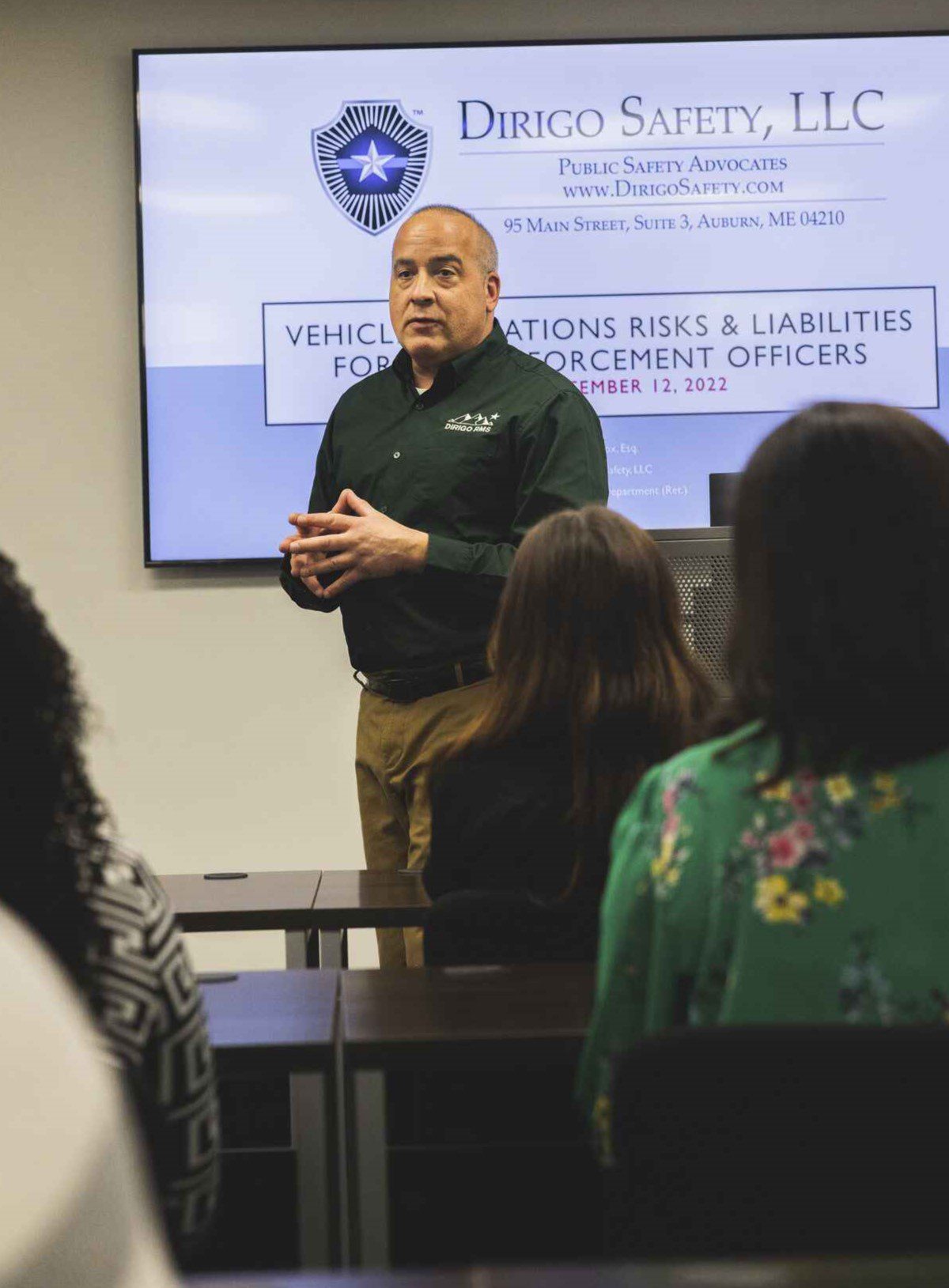Online Elective & On-Demand Classes for Law Enforcement & First Responders
Phase 1: MCJA Pre-Service
To be enrolled in Phase 1 you must complete all paperwork and payment through the Academy first. The academy will send us an email when they have approved your access to the program and we will create your account! You will then receive a registration email from us with login credentials – you must log in within 48 hours of receiving this link for it to remain active.
Online elective courses are a convenient and effective way for Maine, New Hampshire, and Vermont Police and Corrections officers to continue their education and professional development. At Dirigo Safety, LLC, we offer a wide range of online elective courses that cover various topics relevant to law enforcement professionals. These courses can help officers stay updated on the latest best practices, trends, and developments in their field and can also provide valuable skills and knowledge that they can use in their daily work.
The online elective courses can provide law enforcement, corrections, dispatch fire & EMS with the opportunity to specialize in certain areas or to broaden their knowledge and skills in a range of topics. We believe that continuing education is an important part of being a competent and effective law enforcement professional, and we are proud to offer a variety of online elective courses to help officers achieve their goals. These courses are a convenient and flexible way for officers to advance their knowledge and skills without having to travel or take time away from their busy schedules.

Our List of Online Elective classes for Law Enforcement, Corrections Officers, and First Responders
Check our full list of online elective classes for law enforcement officers and corrections officers. Here are some examples of our online electives!
Variant Behavior/Crisis Conflict Management
This online training is for law enforcement officers to learn how to handle interactions with individuals who exhibit emotional variances, such as those with mental disorders or substance abuse issues. It covers the skills and laws needed to effectively handle these situations and balance the enforcement of criminal and mental health codes with the individual’s treatment needs and the officers’ obligation to maintain public safety.
Implicit Human Bias
The Implicit Human Bias class is a two-part training module for Maine law enforcement officers. Part 1 focuses on preparing officers to interact with people from diverse cultural backgrounds by understanding their own implicit biases and prejudices. It teaches officers to recognize the importance of cultural differences and how to avoid discriminatory behavior. Part 2 addresses bias-based policing, including racial profiling, and teaches officers how to avoid actions based solely on common traits or stereotypes. The officers learn how to justify their actions under the Fourth Amendment, how to avoid bias-based policing, and the potential consequences of such actions.
De-escalation and Conflict Resolution
The “De-Escalation and Conflict Resolution” class is designed for law enforcement officers to learn how to handle encounters with mentally ill individuals or those in crisis. The class teaches the definition of conflict resolution and de-escalation, how to identify someone in crisis, and appropriate responses to handle the situation. The objective is to equip officers with effective communication skills and appropriate force options to gain voluntary compliance and resolve conflicts safely. The course has been approved by the New Hampshire Police Standards & Training Council.
Restricting Access to Dangerous Weapons
This class provides training on Maine’s “yellow flag law” which restricts access to dangerous weapons. The updated lesson plan includes information for officers to secure weapons from individuals and the officer’s role in the weapons restriction assessment process. The objectives include understanding the law, outlining the steps necessary for a judge to review a case, identifying methods of weapon seizure, storage procedures, and facilitating the assessment process.
Community Policing
This online training course teaches law enforcement officers about the community policing approach, which involves working with other community agencies and individuals as part of their responsibilities. This approach is effective in increasing the effectiveness of law enforcement agencies by enabling them to work with the public to prevent or intervene in criminal activity.
Managing Encounters With the Mentally Ill
This class provides Maine law enforcement officers with information on how to handle crisis situations, especially those involving mentally ill individuals. The course aims to equip officers with the knowledge and skills to peacefully resolve crisis situations and make appropriate referrals to services. The class covers topics such as mental illness, reasons for a person to go into crisis, common categories of mental illness, strategies for responding to a known mental health crisis, suicide by cop, and requirements for taking a person into protective custody under Maine law. Additionally, the class covers statewide resources available for persons experiencing a mental health crisis.
Ethics in Law Enforcement
This class is focused on ethics in law enforcement. It aims to define ethics-related terms, discuss the source and importance of ethics in society, analyze corrupt officers and the police subculture, assess how to make ethical decisions, examine ways to reduce corruption, and conduct role-plays involving ethical decision-making.
Intranasal Naloxone Administration
The Intranasal Naloxone Administration Training Module is aimed at preparing law enforcement officers, who are often the first to arrive at the scene of a potential opioid overdose. The objectives of the course are to (1) identify why law enforcement should be aware of community naloxone programs; (2) explain the purpose of syringe access programs and the Good Samaritan 911 Law; (3) identify the characteristics of an opioid overdose; (4) identify the steps in caring for someone who has overdosed on opioids; and (5) demonstrate how to use intranasal naloxone to treat an opioid overdose.